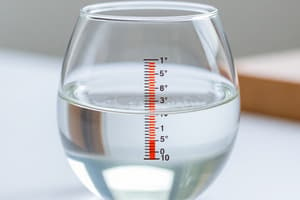Podcast
Questions and Answers
Match each phase change with its corresponding term:
Match each phase change with its corresponding term:
Liquid to solid = Freezing Gas to liquid = Condensation Gas to solid = Deposition
Does each statement refer to a chemical property or a physical property? Balsa is a very light wood.
Does each statement refer to a chemical property or a physical property? Balsa is a very light wood.
- Physical property (correct)
- Chemical property
Does each statement refer to a chemical property or a physical property? If held in a flame, magnesium metal burns in air.
Does each statement refer to a chemical property or a physical property? If held in a flame, magnesium metal burns in air.
- Chemical property (correct)
- Physical property
Does each statement refer to a chemical property or a physical property? Mercury has a density of 13.6 g/mL.
Does each statement refer to a chemical property or a physical property? Mercury has a density of 13.6 g/mL.
Does each statement refer to a chemical property or a physical property? Human blood is red.
Does each statement refer to a chemical property or a physical property? Human blood is red.
Does each statement refer to a chemical property or a physical property? The elements sodium and chlorine can combine to make table salt.
Does each statement refer to a chemical property or a physical property? The elements sodium and chlorine can combine to make table salt.
Does each statement refer to a chemical property or a physical property? The metal tungsten does not melt until its temperature exceeds 3,000°C.
Does each statement refer to a chemical property or a physical property? The metal tungsten does not melt until its temperature exceeds 3,000°C.
Does each statement refer to a chemical property or a physical property? The ingestion of ethyl alcohol can lead to disorientation and confusion.
Does each statement refer to a chemical property or a physical property? The ingestion of ethyl alcohol can lead to disorientation and confusion.
Does each statement refer to a chemical property or a physical property? The boiling point of isopropyl alcohol, which is used to sterilize cuts and scrapes, is lower than the boiling point of water.
Does each statement refer to a chemical property or a physical property? The boiling point of isopropyl alcohol, which is used to sterilize cuts and scrapes, is lower than the boiling point of water.
Define Element.
Define Element.
How does it differ from a compound?
How does it differ from a compound?
Define Compound.
Define Compound.
How does it differ from an element?
How does it differ from an element?
Give two examples of a heterogeneous mixture.
Give two examples of a heterogeneous mixture.
Give two examples of a homogeneous mixture.
Give two examples of a homogeneous mixture.
Identify xenon.
Identify xenon.
Identify blood.
Identify blood.
Identify water.
Identify water.
Identify sugar.
Identify sugar.
Identify hydrogen.
Identify hydrogen.
Identify dirt.
Identify dirt.
Identify air.
Identify air.
Identify ringer's lactate.
Identify ringer's lactate.
Identify tartaric acid.
Identify tartaric acid.
What word describes the phase change from solid to liquid?
What word describes the phase change from solid to liquid?
What word describes the phase change from liquid to gas?
What word describes the phase change from liquid to gas?
What word describes the phase change from solid to gas?
What word describes the phase change from solid to gas?
What is Science?
What is Science?
What is Chemistry?
What is Chemistry?
Explain the differences between the physical properties of matter and the chemical properties of matter.
Explain the differences between the physical properties of matter and the chemical properties of matter.
What is the difference between a heterogeneous mixture and a homogeneous mixture? Give an example of each.
What is the difference between a heterogeneous mixture and a homogeneous mixture? Give an example of each.
Give at least two examples of a phase change and state the phases involved in each.
Give at least two examples of a phase change and state the phases involved in each.
Flashcards are hidden until you start studying
Study Notes
Phase Changes
- Freezing occurs when a liquid turns into a solid.
- Condensation is the process of a gas transforming into a liquid.
- Deposition refers to a gas changing directly into a solid.
Properties of Matter
- Physical Properties can be observed without changing the substance, e.g., mass, color, density.
- Chemical Properties involve a substance’s ability to undergo a chemical change, e.g., flammability.
Classifying Matter
- Elements are pure substances that cannot be broken down into simpler components, e.g., aluminum (Al).
- Compounds are substances formed from two or more elements in a fixed ratio, e.g., water (H₂O).
- Mixtures consist of two or more substances where individual identities are retained.
- Heterogeneous mixtures have distinguishable components, e.g., soil or a salad.
- Homogeneous mixtures have uniform composition, e.g., saltwater.
States of Matter
- Matter exists in three primary phases: solid, liquid, and gas.
- Solids: Definite shape and volume.
- Liquids: Definite volume but adapt to the shape of their container.
- Gases: No definite shape or volume; expand to fill their container.
Phase Changes and Their Names
- Melting/Fusion: Solid to liquid.
- Boiling/Evaporation: Liquid to gas.
- Sublimation: Solid to gas.
Examples of Mixtures and Substances
- Heterogeneous Mixtures: Salt and pepper mix, cereal.
- Homogeneous Mixtures: Vinegar, rubbing alcohol.
Recognizing Matter
- Identifying examples of matter:
- Humans, buildings, air, and text materials (books, soda, etc.) qualify as matter.
Scientific Method
- An organized process involving:
- Proposing a hypothesis
- Testing the hypothesis through experiments
- Refining the hypothesis based on experimental results.
Understanding Science and Chemistry
- Science: The systematic study of the natural universe through observation, experimentation, and modeling.
- Chemistry: The specific study of matter and its behaviors.
Conclusion
- All matter can be categorized through its properties and phase; understanding this classification is essential in physical science.
Studying That Suits You
Use AI to generate personalized quizzes and flashcards to suit your learning preferences.




